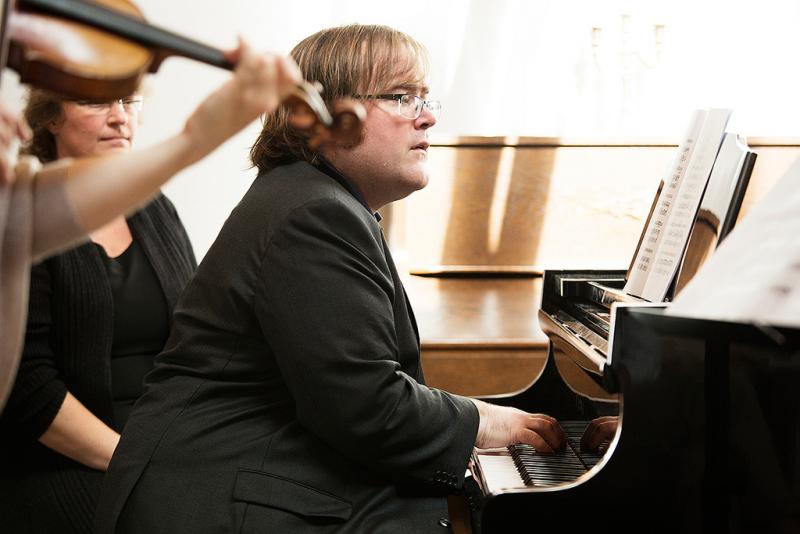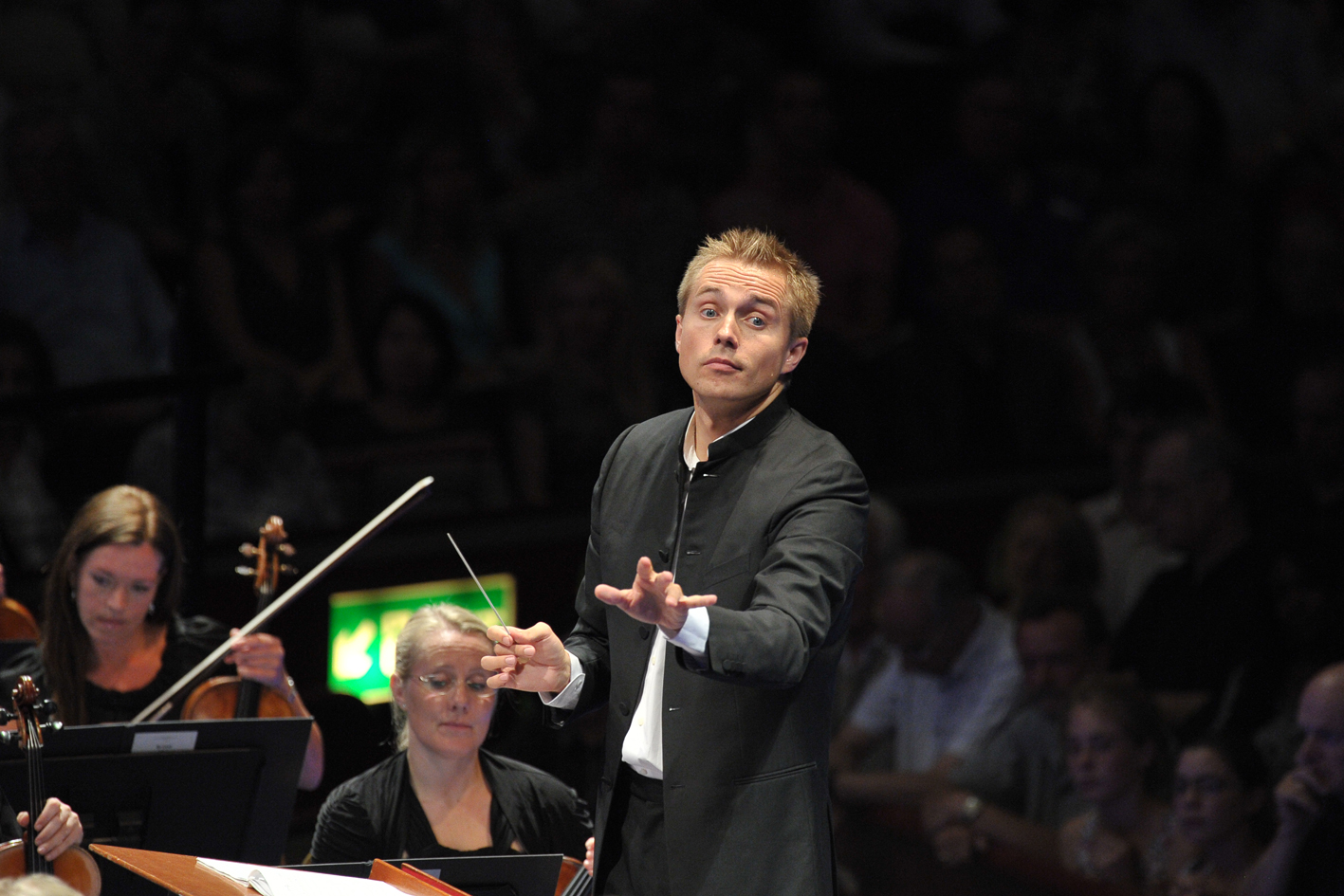Prom 69: Hadland, Oslo Philharmonic Orchestra, Petrenko | reviews, news & interviews
Prom 69: Hadland, Oslo Philharmonic Orchestra, Petrenko
Prom 69: Hadland, Oslo Philharmonic Orchestra, Petrenko
Pearly early Beethoven projects effortlessly, but trickiest Bruckner proves boggy as usual

May I be permitted a rude, opinionated intermezzo between reflections on Vasily Petrenko’s two Oslo Philharmonic Proms, and before Marin Alsop steps up to great expectations for the Last Night?
Petrenko is certainly best advised - and not just by me - to keep his mouth shut. My opinion is tinged by slightly bitter personal experience. Having been on the receiving end of some rather daft low-level, audience-complicit teasing when I conducted the second of two public interviews with him before Festival Hall performances, I’d say that mouth is not always engaged to brain – partly understandably, since English is not his first language - whatever the intention. The elegant, tapering hands certainly are, however, and always have been ever since I heard him conduct his Royal Liverpool Philharmonic Orchestra in Rachmaninov’s Symphonic Dances at the 2008 Proms. This time, though, the feet were partly mired in trickiest Bruckner.
 I admit it: I have a blind spot for Bruckner’s Fourth Symphony which has only got worse over the years, and didn’t shrink last night. There’s such promise in the horn solo with the dawn shimmering around it, such beauty in some of the ideas, such atmosphere when Bruckner admits he’s lost in the forest and just stands and wonders. But in the bigger picture, what usually feels like stop-start helplessness proves inimical to the kind of long symphonic lines Petrenko (pictured above with, ahem, undistracted Scandinavian women viola-players by Chris Christodoulou) conveys so well in Rachmaninov and Shostakovich.
I admit it: I have a blind spot for Bruckner’s Fourth Symphony which has only got worse over the years, and didn’t shrink last night. There’s such promise in the horn solo with the dawn shimmering around it, such beauty in some of the ideas, such atmosphere when Bruckner admits he’s lost in the forest and just stands and wonders. But in the bigger picture, what usually feels like stop-start helplessness proves inimical to the kind of long symphonic lines Petrenko (pictured above with, ahem, undistracted Scandinavian women viola-players by Chris Christodoulou) conveys so well in Rachmaninov and Shostakovich.
Bar by bar, most of the sounds were refined, though Petrenko’s forthright approach to the great blazes made some of them – especially in the finale – simply sound banal. His Oslo strings created numinous halos - if only the one at the start hadn’t been obliterated by a door opening and closing with noisy accompanying fuss in the box behind me – and responded well to his fine-tuning in the slow movement, though they didn’t wear and in my experience never have worn crowns of fire. Horns thrust masterfully into the Albert Hall spaces, but having all the brass gathered close together in the centre cancelled the possibilities of antiphonal halloos in the hunting scherzo and a general sense of breadth elsewhere (that’s one thing the hall is good at; why not make use of it?).
Hadland’s first, pearly sound was a shoot straight out of the lovely orchestral plant No such problems of circulation affected the pre-interval performance of Beethoven’s Second Piano Concerto, more proof that the more intimate the scale, the better a piece can project in this surprising space if the artists don't force it. Neither Petrenko nor the young Norwegian pianist Christian Ihle Hadland, with whom I'd discussed this very Proms point at his Stavanger festival the other week, made any attempts to impose the future Beethoven on this early charmer; it was all Mozartian smiles, turns and trill (and what trills, equal to Paul Lewis’s in the same repertoire at the 2010 Proms). Hadland’s first, pearly sound was a shoot straight out of the lovely orchestral plant, or if you want further imagery, a stream from a pure spring that rarely stopped flowing, never gave way to any sort of affectation. When it did come to a halt, as in the chords which closed the first-movement cadenza - a later addition on Beethoven's part, sounding quirky but not stylistically disjunct here - the effect was surprising.
The Adagio trod air, more of an andante which is fine by me and without a hint of preciousness; the finale sparkled, lilted and danced unselfconsciously. Applause took proper measure: not wild but sustained. Hadland’s delicious encore - I wavered as I listened between Couperin, Byrd and Dowland (yes, really), and though Andrew McGregor announced it on Radio 3 as Couperin, it turned out to be a Byrd Galliard - was a model of introspective charm, all the more welcome to me as I hadn’t heard the pianist on his own in Stavanger. Now there’s no doubt at all: another distinctive personality among top pianists has truly arrived on the scene.
rating
Share this article
Add comment
The future of Arts Journalism
You can stop theartsdesk.com closing!
We urgently need financing to survive. Our fundraising drive has thus far raised £49,000 but we need to reach £100,000 or we will be forced to close. Please contribute here: https://gofund.me/c3f6033d
And if you can forward this information to anyone who might assist, we’d be grateful.

Subscribe to theartsdesk.com
Thank you for continuing to read our work on theartsdesk.com. For unlimited access to every article in its entirety, including our archive of more than 15,000 pieces, we're asking for £5 per month or £40 per year. We feel it's a very good deal, and hope you do too.
To take a subscription now simply click here.
And if you're looking for that extra gift for a friend or family member, why not treat them to a theartsdesk.com gift subscription?
more Classical music
 Hallé John Adams festival, Bridgewater Hall / RNCM, Manchester review - standing ovations for today's music
From 1980 to 2025 with the West Coast’s pied piper and his eager following
Hallé John Adams festival, Bridgewater Hall / RNCM, Manchester review - standing ovations for today's music
From 1980 to 2025 with the West Coast’s pied piper and his eager following
 Kaploukhii, Greenwich Chamber Orchestra, Cutts, St James's Piccadilly review - promising young pianist
A robust and assertive Beethoven concerto suggests a player to follow
Kaploukhii, Greenwich Chamber Orchestra, Cutts, St James's Piccadilly review - promising young pianist
A robust and assertive Beethoven concerto suggests a player to follow
 Robin Holloway: Music's Odyssey review - lessons in composition
Broad and idiosyncratic survey of classical music is insightful but slightly indigestible
Robin Holloway: Music's Odyssey review - lessons in composition
Broad and idiosyncratic survey of classical music is insightful but slightly indigestible
 Classical CDs: Wolf-pelts, clowns and social realism
British ballet scores, 19th century cello works and contemporary piano etudes
Classical CDs: Wolf-pelts, clowns and social realism
British ballet scores, 19th century cello works and contemporary piano etudes
 Bizet in 150th anniversary year: rich and rare French offerings from Palazzetto Bru Zane
Specialists in French romantic music unveil a treasure trove both live and on disc
Bizet in 150th anniversary year: rich and rare French offerings from Palazzetto Bru Zane
Specialists in French romantic music unveil a treasure trove both live and on disc
 Scottish Chamber Orchestra, Ibragimova, Queen’s Hall, Edinburgh review - rarities, novelties and drumrolls
A pity the SCO didn't pick a better showcase for a shining guest artist
Scottish Chamber Orchestra, Ibragimova, Queen’s Hall, Edinburgh review - rarities, novelties and drumrolls
A pity the SCO didn't pick a better showcase for a shining guest artist
 Kilsby, Parkes, Sinfonia of London, Wilson, Barbican review - string things zing and sing in expert hands
British masterpieces for strings plus other-worldly tenor and horn - and a muscular rarity
Kilsby, Parkes, Sinfonia of London, Wilson, Barbican review - string things zing and sing in expert hands
British masterpieces for strings plus other-worldly tenor and horn - and a muscular rarity
 From Historical to Hip-Hop, Classically Black Music Festival, Kings Place review - a cluster of impressive stars for the future
From quasi-Mozartian elegance to the gritty humour of a kitchen inspection
From Historical to Hip-Hop, Classically Black Music Festival, Kings Place review - a cluster of impressive stars for the future
From quasi-Mozartian elegance to the gritty humour of a kitchen inspection
 Shibe, LSO, Adès, Barbican review - gaudy and glorious new music alongside serene Sibelius
Adès’s passion makes persuasive case for the music he loves, both new and old
Shibe, LSO, Adès, Barbican review - gaudy and glorious new music alongside serene Sibelius
Adès’s passion makes persuasive case for the music he loves, both new and old
 Anja Mittermüller, Richard Fu, Wigmore Hall review - a glorious hall debut
The Austrian mezzo shines - at the age of 22
Anja Mittermüller, Richard Fu, Wigmore Hall review - a glorious hall debut
The Austrian mezzo shines - at the age of 22
 First Person: clarinettist Oliver Pashley on the new horizons of The Hermes Experiment's latest album
Compositions by members of this unusual quartet feature for the first time
First Person: clarinettist Oliver Pashley on the new horizons of The Hermes Experiment's latest album
Compositions by members of this unusual quartet feature for the first time

Comments
David, the ladies that are to
Thanks, Colin, corrected (I'd
Thanks, Colin, corrected (I'd forgotten he had violas rather than second violins to his right).